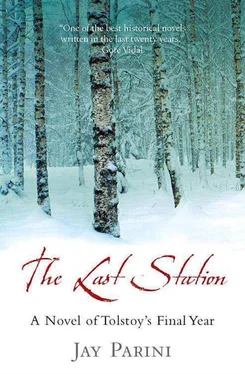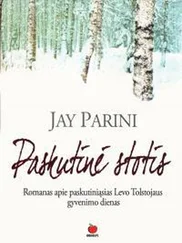‘There’s almost nothing to tell.’
‘I don’t mean to pry. It’s just that I like to know everything about my friends. I’m nosy.’
‘It’s good that you would ask me, but I suspect you’ll be disappointed. I’ve been enamored of many…’ I hung on the lip of that modifier, speechless.
I would have told her everything – what little there is – but I found it difficult to talk about my past relations. It seemed like a betrayal of this moment of intimacy. I wanted to believe, I did believe, that Masha and I were the only people left on the planet just then.
‘I had a lover before coming here,’ she said. ‘He was the headmaster of the school where I taught. His name was Ivan.’
‘Ivan the Terrible,’ I said. My head was swirling. I thought I might fall off the bed.
‘He was married – happily married. This made things difficult for us, since we could only make love at school.’
‘At school?’
‘In the gymnasium, when the girls had left for the day. It was a day school, you see. There were straw mats on the floor. In the gymnasium.’
‘Ah, I see,’ I said. But I didn’t. My fists clenched, unclenched. Women of Masha’s class and rank in society do not allow themselves to be used in this way. She is not a serf.
‘He was much older, almost forty,’ she said. I felt, perhaps unjustly, that she enjoyed telling me, as if my torment gave her pleasure. ‘There was no future in it, nowhere it could go. I’m much happier here.’
I wanted to respond but couldn’t. Fortunately, she didn’t require a response from me. Her narrative had its own life, which had nothing to do with me.
‘My parents suspected that Ivan and I were involved in a dangerous way. I had talked about him rather too freely. Though they detest Tolstoy, they were glad when I left Petersburg. At least in Telyatinki they thought I would not cause them embarrassment.’
It was all quite baffling, but I didn’t want to appear ignorant. I was, myself, still a virgin. And it seemed ludicrous and unreal that Masha wasn’t. In romantic novels, it does not work like this.
‘You look distracted, Valya,’ she said. ‘Have I upset you?’
‘No. I appreciate your frankness.’
‘You disapprove of me. I see that in your eyes.’
‘I don’t.’
She stood up, growing more furious every moment. ‘I’m sorry I told you all of this. I should never have spoken.’
‘I’m glad you told me.’
‘You are a prig, aren’t you? A puritan, like Sergeyenko. I should have guessed. Why else would they have hired you? You’re a hired man, aren’t you?’
‘That’s not fair.’
‘I don’t care if it’s fair. It’s true. What is true is rarely fair.’
‘Masha.’ I stood up. ‘I’m leaving.’
‘Do as you like, Valentin Fedorovich.’
She walked over to the window and looked out, sulking. The dusk was coming on fast, its violet color streaking the horizon. The room had a gloomy luster that made everything seem unreal.
‘Good-bye,’ I said.
She stood, silent, looking away from me. I closed the door behind me softly, though inside I raged.
Once in a while Papa takes me riding with him in the afternoons. He rides Delire, ‘the Count’s horse,’ as the muzhiks say, which means that nobody else dares ride her. We trot aimlessly along little trails in the forest as branches snap across our faces and bracken thickens into brake; pretty soon you can’t tell where you are, but Papa simply presses forward. The more difficult the terrain, the better he likes it.
If a stream crosses our path, Papa will urge Delire on, shouting ‘Heigh!’ like a Tartar and whipping her rump. Delire will jump a small stream or swim a larger one with relish. Once clear of the water, she’ll charge ahead, uphill, with Papa shouting. It is impossible to keep up with them.
One day we were galloping past the old iron foundry when Delire stepped into some loose shale, skidded, and lost her footing. Papa pitched sideways off the saddle as Delire crashed on her flank! I panicked, but Papa, without even dropping the bridle from his hand, slipped from the stirrups and landed on his feet beside the whinnying horse.
‘That’s my girl,’ he said, putting his face against Delire and whispering in her ear, stroking her long, thick neck.
The horse got back onto her feet, and Papa led her over the shale and remounted. I couldn’t believe a man of his age could be so agile. ‘See that your mother hears nothing about this spill,’ he said.
Last summer, riding near the Voronka, we passed the little hut we often use as a bathhouse. Soon we came into a small clearing that, in spring, is spread with a bright quilt of forget-me-nots. That day, fat boroviki mushrooms studded the field, glistening on their rosy stems, their tops like velvet and their underlining a rich, creamy tan. Papa stopped and dismounted.
‘Is anything wrong?’ I asked, coming to a halt.
‘Right over there,’ he said, pointing his whip to a deep grassy spot between two lordly oaks. ‘I want to be buried there.’
He looked at me, squinting. I nodded, slowly, keeping my eyes on his. ‘All right, Papa,’ I said.
He smiled, and a look of strange satisfaction passed over his old face. I was smiling, too, aware that something of great importance had passed between us.
‘Let’s go home,’ Papa said, breaking the spell. ‘I could use a glass of tea.’
He has never again mentioned that incident in the clearing, but I have not forgotten his request. Until that moment, it never occurred to me that Papa could die.
* * *
In the thickest part of Zasyeka, Papa’s favorite haunt, is a small trail that leads to a spring at the bottom of the woods. A pool of clear water has formed in one spot, and the horses drink there. We call it Wolves’ Well. Nearby, a family of badgers live like kings in a dusty hillock. They burrow into deep dens that branch into a maze of connecting tunnels. Papa occasionally brings his favorite dogs – Tiulpan and Tsygan – here; they are crazy for badgers, scratching away at the hillock with a wild hope of unearthing them.
Papa says that writing is like that: you keep scratching away at the dirt, hoping a badger might run out. But it rarely does.
Sometimes, in spring, Papa would come into my room after lunch, saying, ‘Sasha, would you like to go on a vegetarian hunt with me?’ We didn’t really hunt as he did as a young man in the Caucasus, where he’d charge like a madman (so he says) through fields teeming with hare, killing as many as sixty in a day. Papa loves bragging about his wayward youth, though it makes people like Dushan Makovitsky or Sergeyenko wince. They want to believe he was always as he is now – as if morality were a gift, bestowed at birth, not something won by hard spiritual work, by the agony of living through sin.
So we’d pull on thick marsh boots that smelled of tar, and I’d race after him across the orchard into the Chapysh and, farther on, into the blue shadows of Zasyeka. Snow, muddy and caked, still clung to the dark sides of ditches. The trees were bare, but the buds would have swollen, turning the woods a washed-out purple. Eventually, we step into a clearing.
‘Shush now,’ Papa would say, putting a finger to his lips.
Sitting on a rock, we’d wait for a long time, trying not to breathe. ‘Become the woods,’ he’d say. ‘You are part of things here.’
Then, when you thought nothing was going to happen that day, Papa would raise one of his furry eyebrows and say, ‘Sasha, look!’
Close by, we’d hear the odd coughing sound of a snipe. It would lift itself into the air, wheeling overhead in great broken rings, then flap across the tips of the trees. Maybe nothing else would come all afternoon, but Papa didn’t seem to mind. We’d sit there, silent and happy, till darkness fell.
Читать дальше












